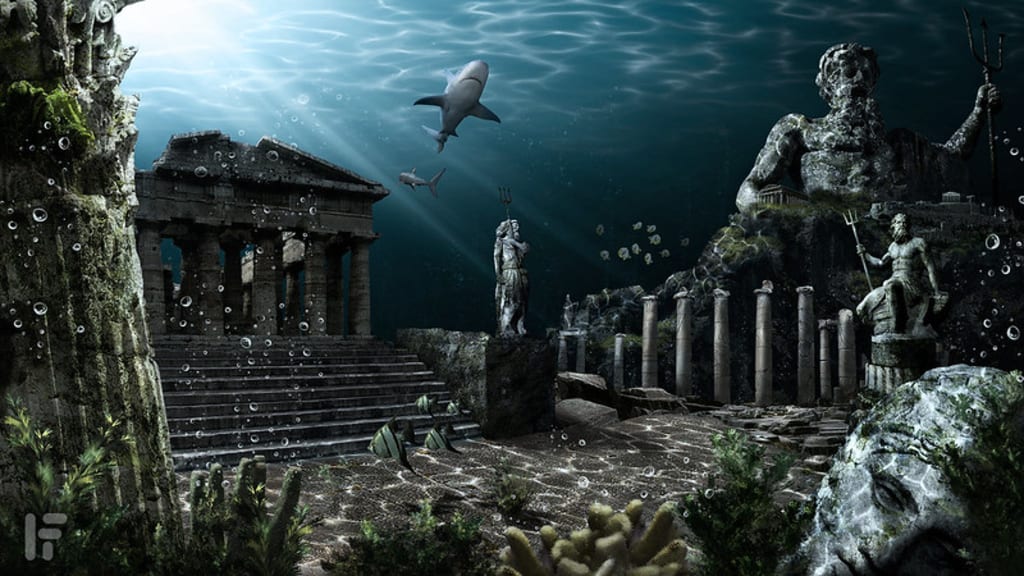The Lost City of Atlantis: Unearthing the Legendary Civilization of Myth and Mystery
The Unsolved

Introduction
The tale of Atlantis, a legendary island civilization lost to the depths of the ocean, has fascinated people for millennia. Described by the ancient Greek philosopher Plato in his dialogues "Timaeus" and "Critias," Atlantis is an enduring enigma that continues to captivate the human imagination. In this article, we will delve into the origins of the Atlantis myth, examine various theories and speculations about its possible existence, and explore the impact of this legendary city on culture and exploration.
The Origin of Atlantis: Plato's Account
The story of Atlantis was first recorded by the ancient Greek philosopher Plato around 360 BCE. In his dialogues "Timaeus" and "Critias," Plato introduces Atlantis as a powerful island nation situated beyond the Pillars of Hercules (believed to be the Strait of Gibraltar). The Atlanteans were said to be an advanced civilization blessed with prosperity, technological prowess, and spiritual wisdom.
According to Plato's account, the Atlanteans eventually became arrogant, and their power corrupted them. As a consequence, they waged war against neighboring lands, including ancient Athens. In a fierce battle, the Athenians triumphed over the Atlanteans, and shortly afterward, a cataclysmic event—a massive earthquake and flooding—sank the entire island beneath the waves of the Atlantic Ocean. This catastrophe, known as the "Submersion of Atlantis," marked the end of the once-great civilization.
Interpreting Plato's Account
Since Plato's dialogues were written in the form of philosophical fiction, scholars have long debated whether Atlantis was a real place or merely an allegorical tale. Some argue that Atlantis served as a cautionary metaphor about the dangers of unchecked power and hubris. Others contend that Plato might have drawn inspiration from real historical events and locations but embellished them to convey his philosophical message.
The Search for Atlantis: Historical Context
In the centuries following Plato's account, various adventurers, scholars, and explorers sought to uncover the truth behind the lost city of Atlantis. However, the lack of concrete geographical references in Plato's dialogues made it challenging to pinpoint the location of the island.
In the 19th and 20th centuries, the rise of archaeology and the popularization of Atlantis in literature reignited public interest. Early proponents of the idea that Atlantis was a real place suggested locations as diverse as the Mediterranean, the Caribbean, Antarctica, and even the Andes Mountains. These speculations, though intriguing, lacked solid evidence to support their claims.
Atlantis in Culture and Literature
The Atlantis myth has left an indelible mark on culture and literature, inspiring numerous writers, poets, and artists throughout history. From Jules Verne's "20,000 Leagues Under the Sea" to H.G. Wells' "The War of the Worlds," the concept of a lost and mysterious civilization has permeated science fiction and adventure literature.
In the realm of fantasy literature, Atlantis has often been portrayed as a fantastical realm of magic and wonder. Writers like J.R.R. Tolkien and C.S. Lewis, among others, wove elements of Atlantis-like civilizations into their fictional worlds, adding depth and mystique to their stories.
Theories and Speculations: Possible Locations
Over the years, various theories have emerged about the possible location of Atlantis, each backed by different lines of evidence and interpretations.
Santorini (Thera): Some researchers propose that the volcanic eruption of Santorini around 1600 BCE may have inspired Plato's account of the destruction of Atlantis. The volcanic explosion caused massive devastation to the Minoan civilization, and it is conceivable that this event became the basis for the Atlantis myth.
The Bahamas and the Caribbean: Atlantis enthusiasts often point to the Bahamas and the Caribbean as potential locations for the lost city. They argue that the region's submerged geological formations, such as the Bimini Road, resemble man-made structures, raising the possibility of a sunken civilization.
Spain and the Doñana Marshes: Another hypothesis suggests that Atlantis could have been located in southern Spain, particularly in the Doñana Marshes near Cadiz. Some researchers claim to have found archaeological evidence, such as circular structures, that could be remnants of an ancient civilization.
Crete: Given the similarity between Minoan civilization and Plato's description of Atlantis, some researchers propose that Crete, the center of the Minoan civilization, might be the inspiration behind the Atlantis myth.
Scientific Skepticism and Modern Views
Despite the enduring allure of Atlantis, most mainstream scholars and archaeologists remain skeptical about its existence as a real, lost civilization. The lack of concrete evidence, coupled with the allegorical nature of Plato's writings, leads them to consider Atlantis more as a literary creation than a historical fact.
Moreover, advances in geology, oceanography, and archaeology have provided a clearer understanding of Earth's geological history and the limits of human civilizations. The idea of a technologically advanced civilization sinking beneath the waves without a trace challenges the laws of nature and the known historical records of human development.
Conclusion
The Lost City of Atlantis stands as a testament to the human fascination with the unknown and the allure of ancient mysteries. Whether a product of Plato's imagination or inspired by real-world events, Atlantis has left an indelible mark on human culture and literature. While its physical existence remains unproven, Atlantis continues to spark curiosity and inspire exploration—both in the pursuit of sunken civilizations beneath the waves and the exploration of the depths of our imagination.
About the Creator
Brandon M
Hey there, I'm Brandon! I'm a passionate writer who loves to write about unsolved mysteries and ghosts. I'm fascinated with the unexplained and love researching strange stories and writing articles about them.
Enjoyed the story? Support the Creator.
Subscribe for free to receive all their stories in your feed. You could also pledge your support or give them a one-off tip, letting them know you appreciate their work.






Comments
There are no comments for this story
Be the first to respond and start the conversation.